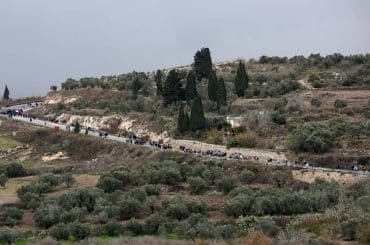[A Press Release from The Palestinian BDS National Committee (BNC) informs Palestinian civil society has called for freezing “Knesset” membership in Inter-Parliamentary Union in Light of Racist Laws]

BDS Logo
“Prawer Plan” to uproot and dispossess indigenous Bedouin-Palestinian Communities in the Naqab (Negev) is latest definitive evidence of the colonial nature of Zionism
Occupied Palestine, 9 July 2013 – The Palestinian BDS National Committee (BNC) condemns the racist and colonial “Prawer Plan” which was adopted by the Israeli government as official policy and recently passed by parliament (Knesset) in the first reading. This plan calls for ethnically cleansing tens of thousands of Bedouin Palestinian citizens of Israel by confiscating hundreds of thousands of dunams [1] of land that they have owned for generations in the Naqab and destroying their homes and communities to expand Jewish-only settlements in the Naqab.
On today’s 8th anniversary of the Palestinian BDS Call, the BNC, which is the largest coalition in Palestinian society, reiterates its unwavering support for the struggle of our people in the 1948 territory against Israeli apartheid and its racist laws [2] and warmly welcomes the principled support for this struggle by anti-Zionist Jewish Israelis. The BNC calls upon all people of conscience around the world to escalate BDS campaigns against the state of Israel and its institutions which are responsible for this latest chapter of ethnic cleansing against our people.
In response to the Israeli parliament’s approval in the first reading of this racist “Prawer Plan”, and given its record of enacting tens of racist laws in the past, Palestinian civil society, as represented in the BNC, calls upon the Inter-Parliamentary Union to freeze the Knesset’s membership until it repeals all racist laws that are inconsistent with international law and the principles and objectives of the United Nations and of the Inter-Parliamentary Union, in particular the principle of “protection and promotion of human rights.”
The “Prawer Plan” is a new chapter of the ongoing Nakba (catastrophe) against the indigenous Palestinian people which started in 1948 when Zionist militias, and later the newly established State of Israel, uprooted and dispossessed a majority of Palestinians from their ancestral land.
The main objective of the Prawer scheme is to sever the historical ties that bind Bedouin Palestinian communities to their land. It therefore presents new irrefutable evidence of the colonial nature of Zionism in thought and practice, as well as the nature of the apartheid system which the Israeli regime imposes on our people in the 1948 territory, reaching its peak with the insistence of this regime on maintaining an exclusionary “Jewish” identity that relegates the indigenous Palestinians into an inferior status by law. This aspect of Israel’s regime of oppression recalls the defining characteristics of apartheid South Africa and the Jim Crow South in the United States.
The “Prawer Plan” violates universal principles of human rights, such as equality and effective participation in decision-making matters that are related to human life and well-being. It specifically violates the United Nations Declaration on the Rights of Indigenous Peoples [3], which in Article (8) states that “Indigenous peoples and individuals have the right not to be subjected to forced assimilation or destruction of their culture,” including “Any action which has the aim or effect of dispossessing them of their lands, territories or resources,” as well as “any form or forced population transfer which has the aim or effect of violating or undermining any of their rights.”
The plan also violates article (10) of the Declaration which prevents forcible removing of the indigenous peoples from their lands or territories.
“Indigenous peoples shall not be forcibly removed from their lands or territories. No relocation shall take place without the free, prior and informed consent of the indigenous peoples concerned and after agreement on just and fair compensation and, where possible, with the option of return.”
All Palestinians in the 1948 territory, regardless of their different ideologies or political affiliations, are waging a determined and unified struggle against the Israeli apartheid regime that they are forced to live under in order to preserve what remains of their lands. Since the 1948 Nakba, successive Israeli governments have illegally looted and confiscated most of the land owned by Palestinians, who became citizens of the state, in order to further entrench the existing apartheid system that racially privileges Jewish citizens over Palestinian (Muslim and Christian) citizens, with legal and legislative cover. The Israeli judicial system and parliament share direct responsibility for their indispensable role in this ongoing process of dispossession and ethnic cleansing of the Palestinian minority in Israel.
The time-honored logic of consistently pressuring rogue states to bring about their compliance with international law, including human rights principles, should be further applied to Israel, a regime of occupation, colonialism and apartheid over the Palestinian people. BDS is one of the main forms of Palestinian popular and civil resistance which aims at regaining our fundamental rights, whether individual or collective, including the rights of nearly 1.5 million Palestinians in the 1948 territory.
BDS has proven over the last 8 years to be the most effective form of international solidarity with the Palestinian struggle for freedom, justice and equality. The impressive achievements of the BDS movement in the last few months, such as Stephen Hawking’s boycott of an Israeli conference organized by Shimon Peres, and the frantic reaction of the Israeli establishment to the inspiring growth of the BDS movement across the world have underlined Israel’s vulnerability to this non-violent, rights-based movement that is anchored in international law, including the Universal Declaration of Human Rights.
[1] One dunam = 1000 m2
[2] The 2002 Rome Statute of the International Criminal Court defines apartheid as “inhumane acts of a character similar to those referred to in paragraph 1, committed in the context of an institutionalized regime of systematic oppression and domination by one racial group over any other racial group or groups and committed with the intention of maintaining that regime.” http://untreaty.un.org/cod/icc/statute/romefra.htm Israel’s regime over its own Palestinian citizens fits this definition as it maintains more than 50 laws that racially discriminate against them. http://adalah.org/eng/Israeli-Discriminatory-Law-Database
[3] http://www.un.org/esa/socdev/unpfii/documents/DRIPS_en.pdf
_______________________________________________



What a great article!
BDS, 1S1P1V, end Apartheid! Thanks Annie.
The British mandatory administration taxed the Bedouin agricultural land that was under cultivation and had the RAF conduct surveys of its extent and population for the UN Ad Hoc Committees on Palestine. The survey revealed that the Bedouins had more agricultural land than the Jewish community’s total combined land holdings. Here’s a relevant portion of the UN partition plan which placed disputes regarding minority property rights under the jurisdiction of the International Court of Justice:
— http://www.yale.edu/lawweb/avalon/un/res181.htm